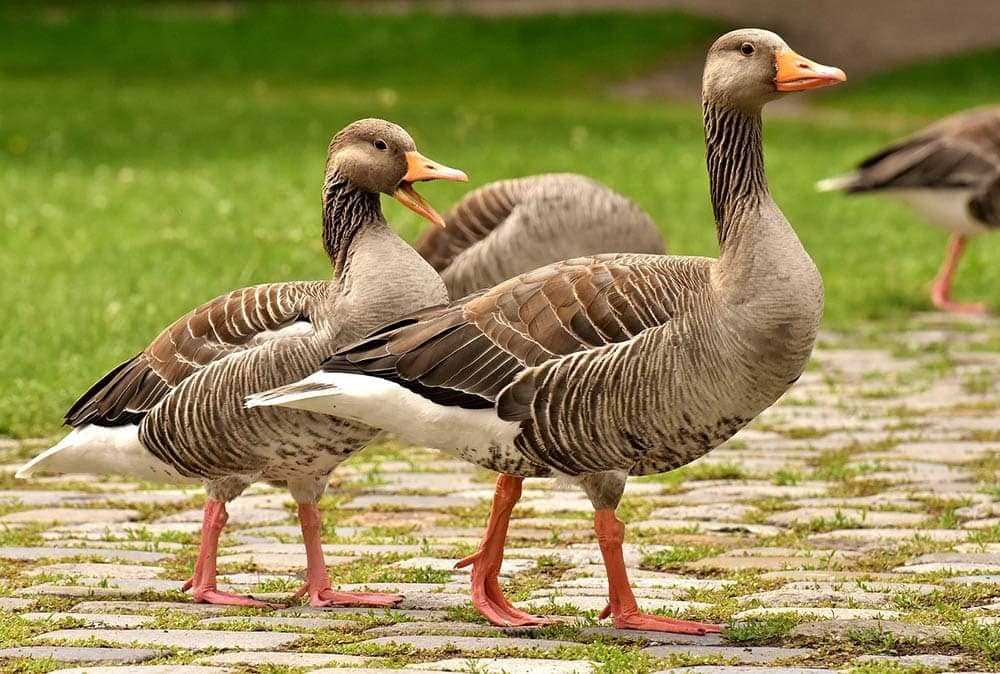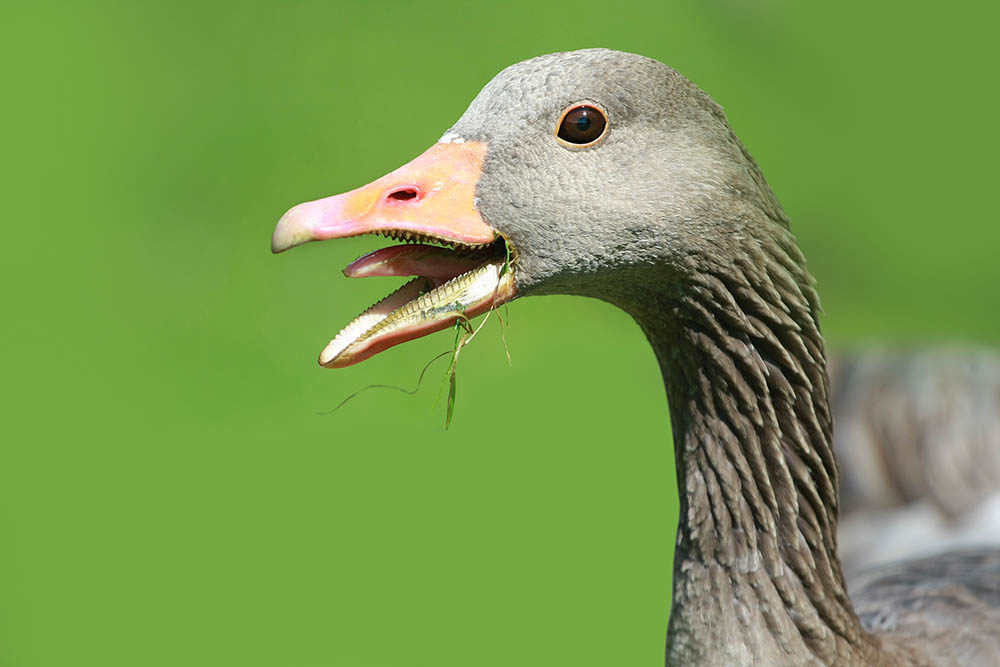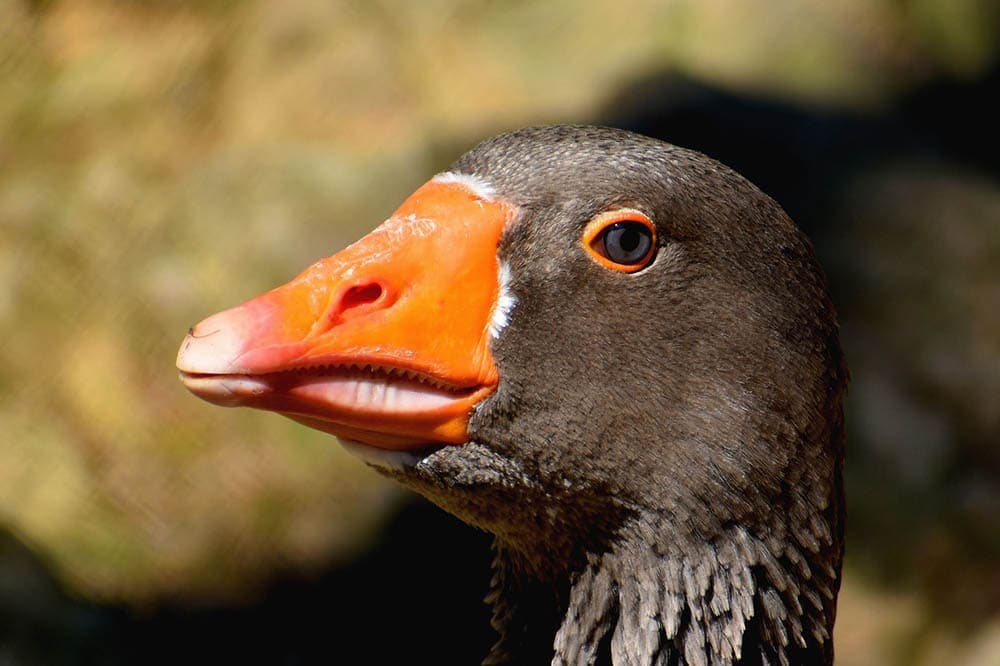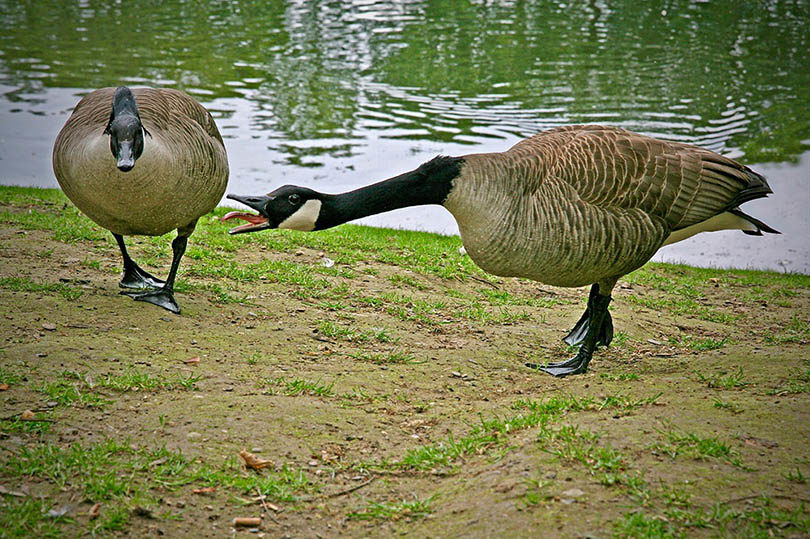Do Geese Have Teeth? Cool Anatomy Facts
Last Updated on

Geese have their own version of teeth that are very different from mammal teeth. Geese don’t have teeth, instead geese have tomia, which is the sharp part of the beak that helps them to break down their food.
Some birds, such as the goose, have serrated edges lining their tomia. They may look like a set of sharp teeth, but geese can’t produce enamel. Instead, the serrated edges are actually cartilage.
A goose’s mouth may look more dangerous than it really is. A goose bite is painful, but it doesn’t usually cause severe damage. However, geese and humans share a lot of common ground, so it’s important to know how to interact with them properly to avoid any serious accidents.
Make sure to stay informed and aware of these natural neighbors so that peaceful cohabitation can exist between humans and geese.

Do Geese Have Teeth on Their Tongues?
Another interesting fact about geese is that the serrated edges on their tomia also line the perimeter of their tongues. So, it appears as though they have spikes coming out of their tongue. These serrated edges are used for getting a grip on food and breaking it down. Geese typically enjoy eating fibrous and tough food, such as grass, barley, oats, cracked corn, and other vegetables. They also like to eat different insects, such as mealworms and crickets.
A lot of these foods can be tough and chewy. So, these serrated edges around the tomium and the tongue help the geese grind and shred their food. This design also helps them to easily tear off their favorite grasses and plants while they graze.

What Happens If You Get Bit By a Goose?
When you know that a goose has a set of spikes running along its bill and tongue, it can be scary to think about getting bitten by one. Fortunately, merely getting bit by a goose typically doesn’t have any fatal effect on a person.
The bite will be painful, and sometimes it may pierce the skin. However, goose bites are easily treated. More harm is done to people when they have a startled reaction to getting bit and fall and trip as they’re running away.
Can Geese Give You Rabies?
No, geese cannot pass on rabies to people. In fact, only mammals can pass rabies to one another and to humans. Therefore, if you or your pet gets bitten by a goose, you don’t have to worry about catching the virus. However, there are some diseases that geese can pass on that you should keep in mind.
Bacteria and Viruses Geese Can Transfer to Humans
Geese can be hosts and carriers of several different kinds of parasites, bacteria, and viruses. Humans should have caution with some of the following bacteria that geese can carry:

Geese can also be a host to several parasites:
So far, the only proven virus that geese can pass to humans is avian influenza. Some scientists speculate that geese can also pass West Nile virus and anatid herpesvirus, but more research has to be done to produce conclusive statements.
Why Do Geese Hiss at You?
These aren’t necessarily aggressive animals, but they are territorial. Since they live in such close proximity to humans, they’re more prone to attacking people than other animals.
Goose bites are usually a final form of defense. Before they choose to bite, they will usually display some defensive and warning signs. You can avoid a goose bite if you can read the signs and act appropriately.
One common sign of defense that geese display is hissing. When you hear a goose hissing, it’s telling you that you are too close to it and that it’s ready to defend itself and its flock if you come any closer.
Another sign to look for is when geese all start to stretch their necks straight towards you. this signals that the goose is getting ready to charge at you. You might also hear the geese honking and see the goose flapping its wings to look larger.

What To Do If a Goose Hisses at You
The best thing to do when a goose hisses at you is to remain calm and keep your distance. Stay far from a goose before it gets to displaying other aggressive behaviors, such as getting ready to charge at you.
If you notice that a goose is ready to charge, slowly back away from the goose and create some distance. Make sure that you move sideways and maintain eye contact with the goose so that it does not try to chase you from behind.
Remember to keep your movements slow and don’t yell or create any loud noises. These things can startle a goose and trigger them to start chasing you. Walk away until the hissing stops.
- See also: Where Do Geese Sleep? How Do They Sleep?
What To Do If a Goose Bites You
Goose bites can be very painful, but they don’t usually cause too much harm. Usually, they bruise the skin. If a goose bite does puncture any skin, seek medical help. Call your doctor and let them know about the bite, and they can provide assistance and guidance. It’s best to contact a medical professional because geese can pass along harmful diseases.

Conclusion
Geese may not be rare birds in North America. However, they definitely have some interesting qualities about them, such as having serrated tomia and tongues.
Geese are not dangerous predators to humans, so they can live harmoniously with people as long as we respect their boundaries and understand the basics of their behavior.
- See also: Are Owls Dangerous To Humans?
Featured Image Credit: Pixabay
About the Author Robert Sparks
Robert’s obsession with all things optical started early in life, when his optician father would bring home prototypes for Robert to play with. Nowadays, Robert is dedicated to helping others find the right optics for their needs. His hobbies include astronomy, astrophysics, and model building. Originally from Newark, NJ, he resides in Santa Fe, New Mexico, where the nighttime skies are filled with glittering stars.
Related Articles:
How to Clean a Refractor Telescope: Step-by-Step Guide
How to Clean a Telescope Eyepiece: Step-by-Step Guide
How to Clean a Rifle Scope: 8 Expert Tips
Monocular vs Telescope: Differences Explained (With Pictures)
What Is a Monocular Used For? 8 Common Functions
How to Clean a Telescope Mirror: 8 Expert Tips
Brightfield vs Phase Contrast Microscopy: The Differences Explained
SkyCamHD Drone Review: Pros, Cons, FAQ, & Verdict
